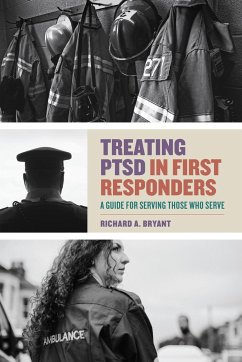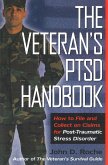- Broschiertes Buch
- Merkliste
- Auf die Merkliste
- Bewerten Bewerten
- Teilen
- Produkt teilen
- Produkterinnerung
- Produkterinnerung
This book shows mental health providers how to understand PTSD in first responders, and outlines practical, evidence-based approaches to assess and treat PTSD in these populations.
Andere Kunden interessierten sich auch für
![Treating Trauma in Adolescents Treating Trauma in Adolescents]() Martha B. Strauss (United States Antioch University New England)Treating Trauma in Adolescents44,99 €
Martha B. Strauss (United States Antioch University New England)Treating Trauma in Adolescents44,99 €![The Veteran's Ptsd Handbook The Veteran's Ptsd Handbook]() John D RocheThe Veteran's Ptsd Handbook15,99 €
John D RocheThe Veteran's Ptsd Handbook15,99 €![Treating Impulsive, Addictive, and Self-Destructive Behaviors Treating Impulsive, Addictive, and Self-Destructive Behaviors]() Peggilee WuppermanTreating Impulsive, Addictive, and Self-Destructive Behaviors44,99 €
Peggilee WuppermanTreating Impulsive, Addictive, and Self-Destructive Behaviors44,99 €![Treating Infants and Young Children Impacted by Trauma Treating Infants and Young Children Impacted by Trauma]() Joy D OsofskyTreating Infants and Young Children Impacted by Trauma40,99 €
Joy D OsofskyTreating Infants and Young Children Impacted by Trauma40,99 €![My PTSD Soul My PTSD Soul]() Earl E Hocquard MallpMy PTSD Soul15,99 €
Earl E Hocquard MallpMy PTSD Soul15,99 €![PTSD Type Symptoms and CGSC Class 08-01, a Study of Field Grade Officers and Implications for the Future PTSD Type Symptoms and CGSC Class 08-01, a Study of Field Grade Officers and Implications for the Future]() Richard L DixonPTSD Type Symptoms and CGSC Class 08-01, a Study of Field Grade Officers and Implications for the Future15,99 €
Richard L DixonPTSD Type Symptoms and CGSC Class 08-01, a Study of Field Grade Officers and Implications for the Future15,99 €![A Life With PTSD A Life With PTSD]() Al AtlanskyA Life With PTSD15,99 €
Al AtlanskyA Life With PTSD15,99 €-
-
-
This book shows mental health providers how to understand PTSD in first responders, and outlines practical, evidence-based approaches to assess and treat PTSD in these populations.
Produktdetails
- Produktdetails
- Verlag: American Psychological Association (APA)
- Seitenzahl: 247
- Erscheinungstermin: 27. Juli 2021
- Englisch
- Abmessung: 227mm x 152mm x 14mm
- Gewicht: 352g
- ISBN-13: 9781433835599
- ISBN-10: 1433835592
- Artikelnr.: 60580759
- Herstellerkennzeichnung
- Libri GmbH
- Europaallee 1
- 36244 Bad Hersfeld
- gpsr@libri.de
- Verlag: American Psychological Association (APA)
- Seitenzahl: 247
- Erscheinungstermin: 27. Juli 2021
- Englisch
- Abmessung: 227mm x 152mm x 14mm
- Gewicht: 352g
- ISBN-13: 9781433835599
- ISBN-10: 1433835592
- Artikelnr.: 60580759
- Herstellerkennzeichnung
- Libri GmbH
- Europaallee 1
- 36244 Bad Hersfeld
- gpsr@libri.de
Richard A. Bryant, PhD, is a Scientia Professor of Psychology at UNSW Sydney. Professor Bryant has researched posttraumatic stress disorder (PTSD) for over 3 years his work has identified key genetic, neural, and psychological factors underpinning PTSD, and he has developed the world amp rsquo s leading screening tools for early identification of PTSD as well as the most commonly used early intervention protocols. Professor Bryant has published widely and served on DSM amp ndash 5 and ICD- committees to define PTSD diagnoses. In 2 he received the Companion of the Order of Australia, Australia amp rsquo s highest honor. He consults with international agencies on management of psychological responses to trauma and adversity.
Acknowledgments
Introduction: An Outline of Treating PTSD in First Responders
1. A Review of Current Knowledge of PTSD
2. What Do We Know About PTSD in First Responders?
3. Models of PTSD
4. Moral Injury in First Responders
5. Assessing PTSD in First Responders
6. Review of Treatments for PTSD
7. The Potential for Psychological Debriefing as a Preventative
Intervention
8. Strategies for Treating PTSD in First Responders
9. Challenges in Treating First Responders
10. Addressing Organizational Stressors During Therapy
11. Forensic Issues
12. Concluding Comments and Future Directions: Treating PTSD in First
Responders
References
Index
About the Author
Introduction: An Outline of Treating PTSD in First Responders
1. A Review of Current Knowledge of PTSD
2. What Do We Know About PTSD in First Responders?
3. Models of PTSD
4. Moral Injury in First Responders
5. Assessing PTSD in First Responders
6. Review of Treatments for PTSD
7. The Potential for Psychological Debriefing as a Preventative
Intervention
8. Strategies for Treating PTSD in First Responders
9. Challenges in Treating First Responders
10. Addressing Organizational Stressors During Therapy
11. Forensic Issues
12. Concluding Comments and Future Directions: Treating PTSD in First
Responders
References
Index
About the Author
Acknowledgments
Introduction: An Outline of Treating PTSD in First Responders
1. A Review of Current Knowledge of PTSD
2. What Do We Know About PTSD in First Responders?
3. Models of PTSD
4. Moral Injury in First Responders
5. Assessing PTSD in First Responders
6. Review of Treatments for PTSD
7. The Potential for Psychological Debriefing as a Preventative
Intervention
8. Strategies for Treating PTSD in First Responders
9. Challenges in Treating First Responders
10. Addressing Organizational Stressors During Therapy
11. Forensic Issues
12. Concluding Comments and Future Directions: Treating PTSD in First
Responders
References
Index
About the Author
Introduction: An Outline of Treating PTSD in First Responders
1. A Review of Current Knowledge of PTSD
2. What Do We Know About PTSD in First Responders?
3. Models of PTSD
4. Moral Injury in First Responders
5. Assessing PTSD in First Responders
6. Review of Treatments for PTSD
7. The Potential for Psychological Debriefing as a Preventative
Intervention
8. Strategies for Treating PTSD in First Responders
9. Challenges in Treating First Responders
10. Addressing Organizational Stressors During Therapy
11. Forensic Issues
12. Concluding Comments and Future Directions: Treating PTSD in First
Responders
References
Index
About the Author








